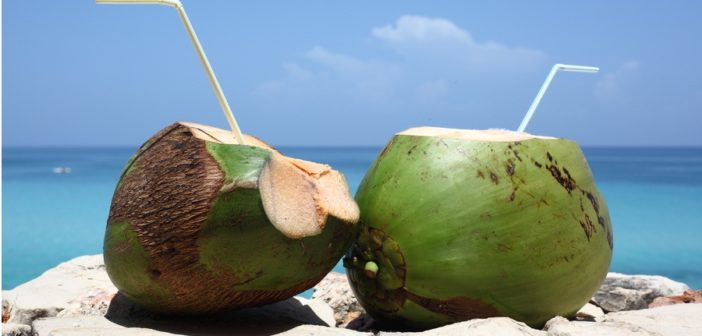Few trendy drinks have enjoyed both the hype and longevity-of-hype that coconut water has. It’s been touted as the perfect post-workout drink, a surefire hangover cure, and even a remedy for kidney stones. Its popularity has also spawned a whole arsenal of other weird waters.
But a coconut water habit, while delicious, ain’t exactly cheap- especially considering that you’ve got plain water ready at the twist of a faucet. So how much of coconut water’s hype is truly deserved?
“Coconut water, like any other fluid, can keep us hydrated,” says Kim Larson, RDN, spokesperson for The Academy of Nutrition & Dietetics. “And, ounce for ounce, it’s lower in sugar than sodas and most fruit juices.” So if you’re not a huge fan of water or you’re trying to cut back on your soda consumption, it’s totally reasonable to swap a few glasses a day for some tasty, refreshing coconut water- as long as regular water is still your first choice.
Plus, coconut water does contain some potassium, an electrolyte mineral which many of us have a hard time getting through our diet alone, Larson explains. Electrolytes keep your nerves and muscles working properly, but you lose them via sweat when you exercise and need to replenish them. Potassium also helps regulate your blood pressure, so it’s a good idea to get the recommended amount (4.7 grams per day for adults), but you’ll find it in whole foods such as bananas, potatoes, broccoli, and milk in much higher amounts than you’d get from coconut water. So while you can certainly supplement your intake of fruits, veggies, and dairy with a little coconut water to get the potassium you need, those foods should still be your main source of the mineral.
Is coconut water ever a better option than plain water? Not really. For the majority of us, water is enough to keep us hydrated during and after workouts as long as we’ve eaten within a few hours. And if you’re an intense athlete- working out for more than 90 minutes, working out twice a day, or just sweating a whole lot- then neither regular water nor coconut water is actually good enough. Even coconut water simply doesn’t have enough sodium to adequately replace what you lose through sweating, Larson says. In those cases, sports drinks that have higher levels of sodium and potassium than coconut water can provide are necessary.
In fact, in at least one rare case, coconut water can be dangerous: People with kidney diseases often need to steer clear from coconut water along with other foods and drinks that are high in potassium because their potassium levels are already high. But the exact amount of potassium you can ingest depends on a lot of factors, such as your weight and medications, so if you have a kidney issue, it’s important to check in with your doctor or a registered dietitian to figure out what makes sense for you.
However, it’s certainly not the worst choice, and it’s just plain tasty. “If it helps you to stay hydrated and drink more fluids, it’s a reasonable option,” Larson says. “However, it’s no better than water, and there are no scientific studies to support any other health claims or benefits to drinking it- including using it as a hangover remedy.”
So, if you want to keep reaching for coconut water after workouts (or nights out), go for it. But don’t expect anything too magical from to come from that carton- good ol’ H2O already has you covered.




